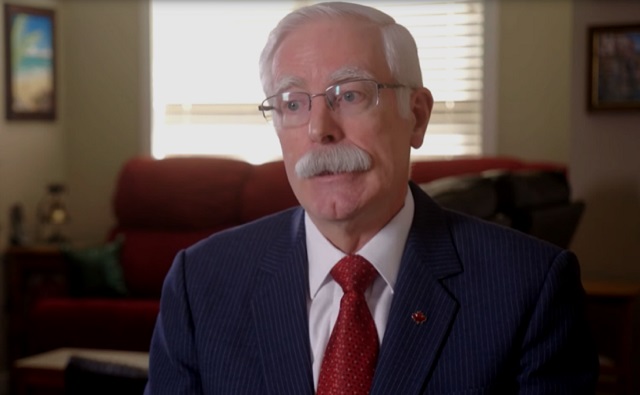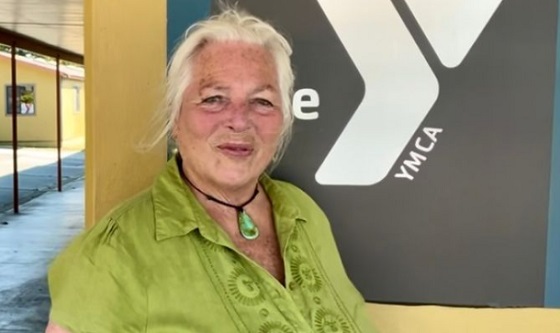Alberta
Redman got it right on COVID response

From the Frontier Centre for Public Policy
By Linda Slobodian
“The fear is still, I would say, in 65% of our population. They are now self-destroying their Charter of Rights and Freedoms.”
Emergency response expert and retired Lt. Col. David Redman tirelessly tried to warn everyone that the “incoherent” chaotic response to COVID-19 was dangerously flawed.
The powers in charge didn’t listen to Redman, a globally respected authority who led Alberta’s Emergency Management Agency (AEMA) for five years and served 27 years with the Canadian Armed Forces.
But finally, Redman’s dire warnings, concerns, and suggested response to dealing with a pandemic were validated by recommendations made by the Public Health Emergencies Governance Review Panel (PHEGRP) in a report submitted to the Alberta government last week.
What the government does with the recommendations remains to be seen.
But steps must be taken to hold decision-makers accountable for “gross negligence” and to help people break out of COVID’s needless “cycle of fear” that still cripples too many, Redman told the Western Standard Friday.
“Canada will pay the costs of this deadly response for decades to come,” said Redman.
Redman’s letters early on to Canada’s premiers warning them that discarding emergency management principles and placing health care officials in charge of pandemic response was dangerous, were ignored.
AEMA strategies, prepared in advance and in place to deal with pandemics, collected dust. Redman led the team that wrote the 2005 Pandemic Influenza Response Plan that was updated in 2014.
Emergency management offices — fully equipped and staffed with experts — in every province and territory were shut out.
Under the direction of health officials, the public was under siege. Punished for disobeying mandates. Subjected to unnecessary lockdowns and school closures. And controlled by a fear factor that defied a tenet of emergency management experts.
“They did it on purpose. They used fear as a weapon. In emergency management you never use fear. You use confidence. You show confidence that the emergency can be handled and present a plan to show how this will be achieved,” said Redman.
He said it is deeply disturbing that people still believe they must keep vaccines up to date and self-isolate. And that must be rectified if even possible.
“The fear that this government generated — by this government I mean every provincial, territorial government, and in particular the federal government — created for two straight years, only broken by the Freedom Convoy — will last until the children that were just entering school in 2020 die.”
Redman said the COVID-19 response was the “exact opposite” of an emergency management response.
“The pandemic response was health only focussed with terrible and deadly costs to individual mental health, societal health, our children, other serious illnesses and diseases, economic viability, and our democratic way of life simply ignored.”
“Unless there is an emergency management plan built, these costs will continue to be massive.”
Well, there’s hope.
The PHEGRP submitted its final report with more than 90 recommendations.
The panel was established by Premier Danielle Smith in January to review the government’s legislation and governance practices to manage the COVID-19 pandemic.
“It is my hope that by adopting these recommendations, the Government will be better equipped to cope with future emergencies and that the impacts on Albertans — their personal livelihoods, civil liberties and mental health — can be mitigated to the greatest extent possible,” said PHEGRP Chair and former Reform party leader Preston Manning in a press release.
Key recommendations include strengthening the AEMA through legislative amendments and budgetary provisions to make it the lead government agency responding to and coordinating the government’s response to future public emergencies.
Redman is “very happy” with Manning’s recommendations.
“There’s a lot of meat in what he’s written.”
“The first and foremost recommendation overarching his whole report is that legislation need to be changed to ensure that the emergency management process and emergency managers are in charge of every emergency including the next pandemic.”
“And that that the AEMA is appropriately funded and staffed to do their new far extended role.”
“He didn’t just say the legislation needs to be changed. He said the government needs to build and fund that organization to be responsible for response for every emergency including pandemics.”
Redman, who testified at the National Citizens Inquiry in Red Deer last April, was pleased with Manning’s wide scope.
“In the first line of each recommendation he’s covered all of the areas from fear being number one, to not doing a hazard assessment to realize that Sars-CoV-2 was really only affecting the elderly.”
“And the terrible destruction of the children and their education system, but more importantly their socialization, the effects on business, the destruction of our economy, and then summing it up with the complete destruction of rights and freedoms.”
“I think they’ve pretty much covered the areas.”
Redman said two steps must be followed immediately.
First, hold a public inquiry to educate the public and “break the cycle of fear.”
“The fear is still, I would say, in 65% of our population. They are now self-destroying their Charter of Rights and Freedoms.”
“They believe Sars-C0V-2, the sixth version of the common cold, is deadly. And they will keep believing it until we do a full, open, transparent public inquiry to teach people that what we did was absolutely wrong and why it was wrong.”
“Step two, there must be a process-driven full-recovery plan … That recovery process has to be complete, covering all the points in the Manning report and any that he might have missed.”
“Again, it must be transparent. And that plan has to be fully implemented with the ability to hold accountable everyone responsible for the gross negligence and criminal negligence that was done during COVID.”
“That will show to the public that what was done wasn’t just wrong, it was criminally wrong, and they can stop the fear.”
The inquiry must address what was done, why and “how do we recover from all of the damage we’ve done.”
“Let’s use children as an example. How do you overcome the loss of academic training. And how do you overcome two years of lack of socialization?”
If the emergency management recommendation is implemented by Smith’s government, citizens can be confident if/when the next pandemic hits.
“Emergency management is made up of professionals who are experts who evaluate daily hazards. They use a disciplined process to mitigate, prepare for, respond to and recovery from all hazards in their jurisdiction,” said Redman.
“The process they use ensures that all required experts, across the public and private sector, are involved in making a plan that evaluates the cost versus the benefits of all possible actions, making a coherent plan that is issued to the public for their engagement and feedback.”
Alberta’s pandemic plan is designed to control the spread of disease, reduce mortality, mitigate societal disruption, minimize adverse economic impact, and support efficient and effective use of recourses during response and recovery.
The Manning report recognized the delicate balance in protecting Albertans during emergencies and honouring rights and freedoms.
It recommended amending the Alberta Bill of Rights, Employment Standards Code, and Health Professions Act to protect the rights and freedoms of all Albertans, including workers and healthcare professionals and freedom of expression during emergencies.
Manning noted that too many Canadians suffered losses — including loved ones, jobs due to “rigorous health protection measures,” businesses, and freedoms.
How different would things have been if people like Redman had been listened to at the time…
Linda Slobodian is the Senior Manitoba Columnist for the Western Standard based out of Winnipeg. She has been an investigative columnist for the Calgary Herald, Calgary Sun, Edmonton Sun, and Alberta Report. This originally appeared in the Western Standard here.
Alberta
Alberta Next: Alberta Pension Plan

From Premier Danielle Smith and Alberta.ca/Next
Let’s talk about an Alberta Pension Plan for a minute.
With our young Alberta workforce paying billions more into the CPP each year than our seniors get back in benefits, it’s time to ask whether we stay with the status quo or create our own Alberta Pension Plan that would guarantee as good or better benefits for seniors and lower premiums for workers.
I want to hear your perspective on this idea and please check out the video. Get the facts. Join the conversation.
Visit Alberta.ca/next
Alberta
COVID mandates protester in Canada released on bail after over 2 years in jail

Chris Carbert (right) and Anthony Olienick, two of the Coutts Four were jailed for over two years for mischief and unlawful possession of a firearm for a dangerous purpose.
From LifeSiteNews
The “Coutts Four” were painted as dangerous terrorists and their arrest was used as justification for the invocation of the Emergencies Act by the Trudeau government, which allowed it to use draconian measures to end both the Coutts blockade and the much larger Freedom Convoy
COVID protestor Chris Carbert has been granted bail pending his appeal after spending over two years in prison.
On June 30, Alberta Court of Appeal Justice Jo-Anne Strekaf ordered the release of Chris Carbert pending his appeal of charges of mischief and weapons offenses stemming from the Coutts border blockade, which protested COVID mandates in 2022.
“[Carbert] has demonstrated that there is no substantial likelihood that he will commit a criminal offence or interfere with the administration of justice if released from detention pending the hearing of his appeals,” Strekaf ruled.
“If the applicant and the Crown are able to agree upon a release plan and draft order to propose to the court, that is to be submitted by July 14,” she continued.
Carbert’s appeal is expected to be heard in September. So far, Carbert has spent over two years in prison, when he was charged with conspiracy to commit murder during the protest in Coutts, which ran parallel to but was not officially affiliated with the Freedom Convoy taking place in Ottawa.
Later, he was acquitted of the conspiracy to commit murder charge but still found guilty of the lesser charges of unlawful possession of a firearm for a dangerous purpose and mischief over $5,000.
In September 2024, Chris Carbert was sentenced to six and a half years for his role in the protest. However, he is not expected to serve his full sentence, as he was issued four years of credit for time already served. Carbert is also prohibited from owning firearms for life and required to provide a DNA sample.
Carbert was arrested alongside Anthony Olienick, Christopher Lysak and Jerry Morin, with the latter two pleading guilty to lesser charges to avoid trial. At the time, the “Coutts Four” were painted as dangerous terrorists and their arrest was used as justification for the invocation of the Emergencies Act by the Trudeau government, which allowed it to use draconian measures to end both the Coutts blockade and the much larger Freedom Convoy occurring thousands of kilometers away in Ottawa.
Under the Emergency Act (EA), the Liberal government froze the bank accounts of Canadians who donated to the Freedom Convoy. Trudeau revoked the EA on February 23 after the protesters had been cleared out. At the time, seven of Canada’s 10 provinces opposed Trudeau’s use of the EA.
Since then, Federal Court Justice Richard Mosley ruled that Trudeau was “not justified” in invoking the Emergencies Act, a decision that the federal government is appealing.
-

 Agriculture1 day ago
Agriculture1 day agoCanada’s supply management system is failing consumers
-

 Alberta18 hours ago
Alberta18 hours agoAlberta uncorks new rules for liquor and cannabis
-

 Crime18 hours ago
Crime18 hours agoProject Sleeping Giant: Inside the Chinese Mercantile Machine Linking Beijing’s Underground Banks and the Sinaloa Cartel
-

 Business1 day ago
Business1 day agoPrairie provinces and Newfoundland and Labrador see largest increases in size of government
-

 Banks2 days ago
Banks2 days agoWelcome Back, Wells Fargo!
-

 International2 days ago
International2 days agoWoman wins settlement after YMCA banned her for complaining about man in girls’ locker room
-

 Economy1 day ago
Economy1 day agoTrump opens door to Iranian oil exports
-

 International10 hours ago
International10 hours agoTrump transportation secretary tells governors to remove ‘rainbow crosswalks’



